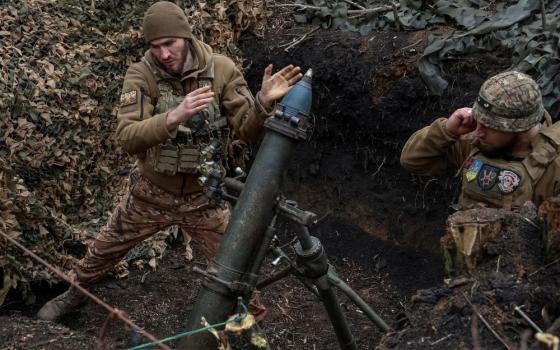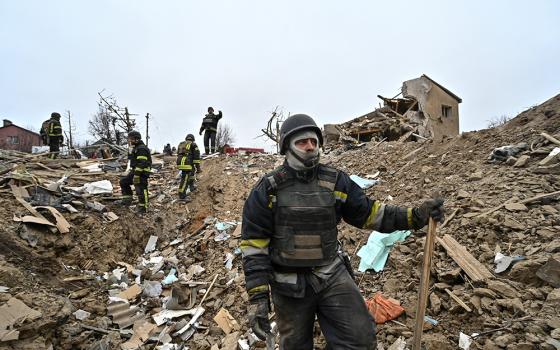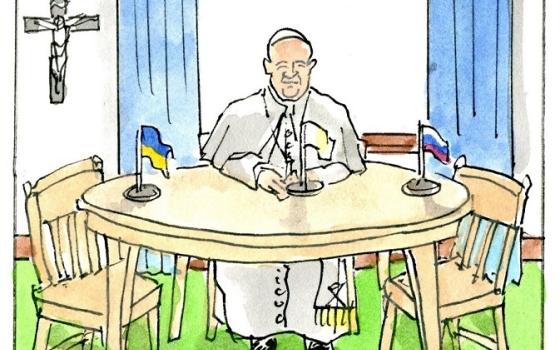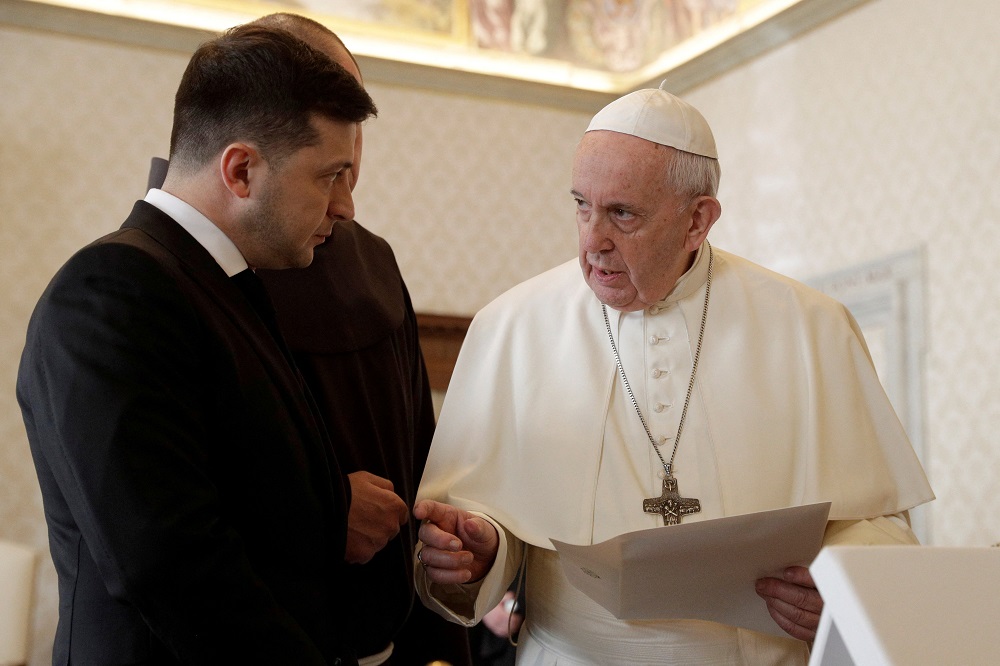
Ukrainian President Volodymyr Zelenskyy is pictured with Pope Francis during a private audience at the Vatican in this Feb. 8, 2020, file photo. Ukrainian church leaders have cautiously welcomed news of an upcoming Vatican visit by Zelenskyy, after a fresh wave of Russian missile attacks in anticipation of a counteroffensive by Kyiv's forces. (CNS/Gregorio Borgia, Reuters pool)
Ukrainian church leaders have cautiously welcomed news of a Vatican visit by their country's president, Volodymyr Zelenskyy, after a fresh wave of Russian missile attacks in anticipation of a counteroffensive by Kyiv's forces.
"President Zelenskyy's visit is clearly connected with the pope's plans for ending this war -- we should be hopeful that, as a mystic who knows the situation from various sides, the Holy Father has something to offer," said Auxiliary Bishop Jan Sobilo of Kharkiv-Zaporizhzhia.
"We stand on the edge of a threatened nuclear war, and the pope seeks peace at all costs so millions will not suffer. Knowing its plans are not working out, the Russian side may well be ready for some move by the Vatican," he said.
The bishop spoke after meeting Pope Francis May 10, while representing Ukraine's Catholic Church at an international peace conference in Sicily.
In an OSV News interview, he said the pope had addressed him in Ukrainian and urged continued prayers, especially for women and children caught up in the 15-month war, adding that he was confident Pope Francis would offer sound advice to President Zelenskyy on what was "best for Ukraine, Russia and the world."
Advertisement
However, another Ukrainian bishop expressed skepticism about current peace prospects and told OSV News he doubted Vatican initiatives would prove effective.
"Of course, there are always grounds for hope -- we must hope the president gains the pope's blessing and can use this for positive purposes," said Bishop Stanislav Szyrokoradiuk of Odessa-Simferopol.
"But while the Vatican shows goodwill, it's also naive. Russia is currently bombarding residential areas to inflict as many deaths and injuries as possible. Faced with such a diabolical force, what sort of peace are we talking about, and how can the pope regulate the situation?"
Italy's Agenzia Nazionale Stampa Associata (ANSA) reported May 11 that Zelenskyy would make a brief Rome visit for talks with the pope and Italian Prime Minister Giorgia Meloni as part of a series of European stopovers.
It would be the second Vatican visit by the Ukrainian head of state, who also held talks with Francis in February 2020 and spoke twice by telephone with the pontiff following Russia's February 2022 invasion.
Ukraine's prime minister, Denys Shmyhal, also visited Rome April 27, presenting the pope with a photo album depicting Russian war crimes and renewing an invitation for Francis to visit Kyiv.
Speaking to journalists April 30 after a three-day visit to Hungary, the pope said the Vatican was currently engaged in a peace "mission," to be made public in due course, although both Moscow and Kyiv denied knowledge of the initiative.
In his OSV News interview, Sobilo said church properties in his eastern Ukrainian Diocese of Kharkiv-Zaporizhzhia had not been damaged by Russia's latest missile strikes, but added that Catholics were fearful about Ukraine's long-planned counteroffensive and "earnestly praying" it would liberate occupied territories.
He added that a successful offensive would strengthen the country's hand in a future peace agreement, pointing to Russian withdrawal from eastern Ukraine and the Crimean Peninsula, but might also be preempted by a Vatican peace plan.
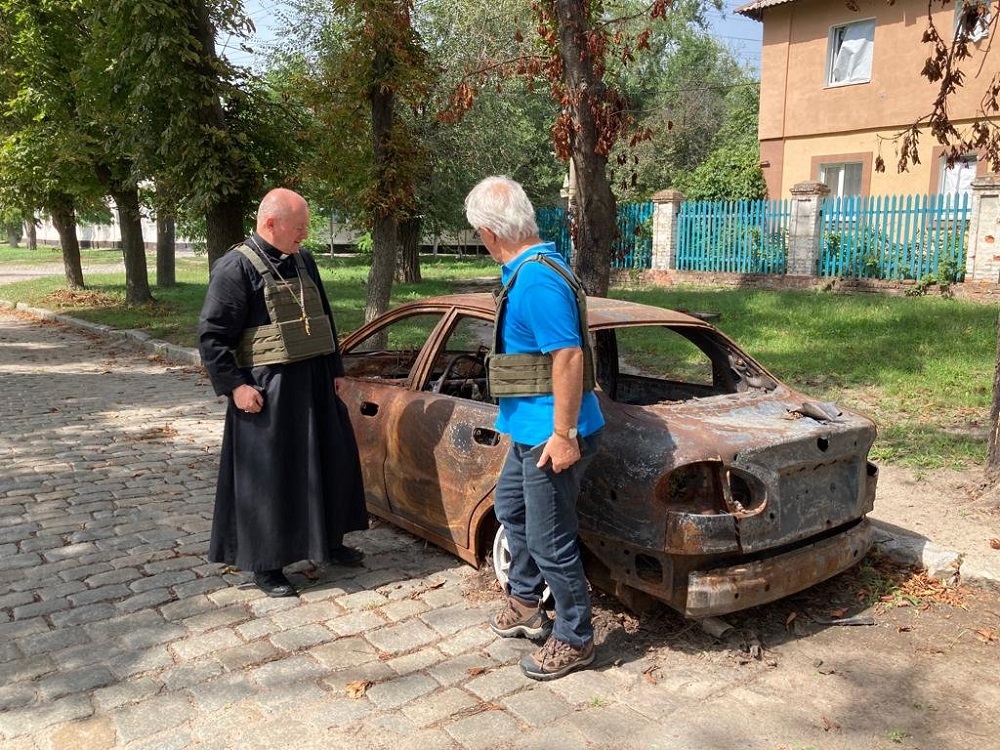
Auxiliary Bishop Jan Sobilo of Kharkiv-Zaporizhia, Ukraine, looks at a destroyed vehicle in in the summer of 2022 in the eastern Ukrainian region covered by the diocese. (OSV News/courtesy Bishop Sobilo)
Meanwhile, Bishop Szyrokoradiuk said a Catholic church had been "destroyed completely" during the latest attacks in the southern Mykolaiv region, with several others suffering damage, but added that he was grateful to God that church life was "functioning normally" in non-occupied areas of his diocese, with most priests still serving in their parishes.
"The counteroffensive is a purely military matter -- what we fear most is losing more people," the Odessa-based bishop told OSV News.
"Every war takes away all the best young people -- and with so many already dead, any intensification of the war will claim new victims. In these circumstances, I hope President Zelenskyy tells the pope the best he can do for us is to come to Ukraine. A papal mission here, with Masses and blessings, would certainly bear fruit."
The Vatican's secretary of state, Cardinal Pietro Parolin, confirmed to the ANSA news agency May 10 that a confidential "Holy See peace mission" was underway, adding he was confident it "will move forward."
On May 9, however, the U.S. Biden administration announced a new $1.2 billion military aid package to bolster Kyiv's air defenses and ammunition supplies, while Ukrainian officials said Russian forces were forcibly evacuating civilians from the partially occupied Kherson and Zaporizhzhia regions.
Meanwhile, Russian Orthodox Patriarch Kirill urged his country's armed forces to remain "fearless, strong and capable" during their "war of defense" against Ukraine at a Kremlin wreath-laying ahead of the country's traditional May 9 Victory Day.
In his speech to the Moscow parade, President Vladimir Putin said a "real war" had "once again been unleashed" against Russia, placing civilization at a new "decisive turning point," as "Western globalist elites" imposed "a system of robbery, violence and oppression," and sowed "hatred, russophobia and aggressive nationalism, and destroying traditional family values that make a person a person."
He added that the Russian society was praying for soldiers on the front line of the "special military operation" in Ukraine, on whom the country's future security and statehood "depended."
In his OSV News interview, Sobilo said he believed the Vatican was rightly keeping details of its peace plans confidential, knowing "undercover talks with the various sides" stood the best chance of success, adding that the prospect of defeat could impel Russia to "save face and exit from the war."
The bishop said he believed the world was "looking at Russia differently" in light of its military failures, and paying less attention to Putin's attempts to "frighten people into thinking his country is a great power to be feared."
However, Szyrokoradiuk said he doubted Moscow was ready "to conduct negotiations," adding that any peace mission would have trouble identifying "people to believe and trust" on the Russian side.
"Russia is an absolute force for evil, and nothing can be done other than to defeat this evil in any way we can. This is what we must pray for now," the bishop told OSV News.





